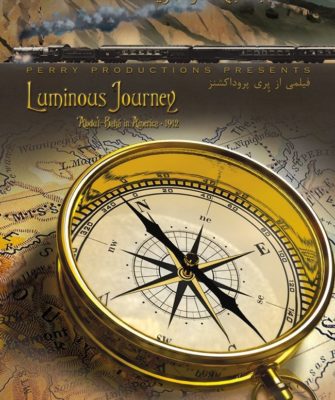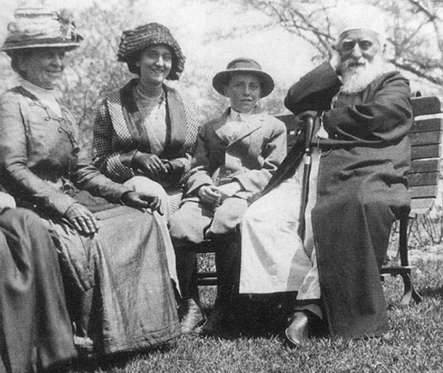



Source:The Chosen Highway, Lady Blomfield
Certain of those who thronged to see the Master, having travelled from far countries, were naturally anxious to spend every possible moment with Him, Whose deeds and words appealed to them as ever-filled with grace and love. Therefore it came about that day after day, whilst the Master was teaching, the luncheon gong would sound, and those who remained would be invited to sit at food with Him. We grew to expect that there would be nineteen guests at table, so often did this number recur.
These were much-prized times; ‘Abdu’l-Bahá would continue the interrupted discourse, or tell some anecdote, often humorous, meanwhile frequently serving the guests with His own hands, offering sweets, or choosing various fruits to distribute to the friends.
The following touching incident took place one day when we were seated at table with the Master.
A Persian friend arrived who had passed through `Ishqabad,. He presented a cotton handkerchief to ‘Abdu’l-Bahá, Who untied it, and saw therein a piece of dry black bread, and a shrivelled apple.
The friend exclaimed: “A poor Bahá’í workman came to me: `I hear thou goest into the presence of our Beloved. Nothing have I to send, but this my dinner. I pray thee offer it to Him with my loving devotion.'”
‘Abdu’l-Bahá spread the poor handkerchief before Him, leaving His own luncheon untasted. He ate of the workman’s dinner, broke pieces off the bread, and handed them to the assembled guests, saying: “Eat with me of this gift of humble love.”
Of the guests who remained to lunch or dinner, the Master would often hold out His hand to the humblest or most diffident, lead them into the dining-room, seat him or her at His right hand, smile and talk until all embarrassment had passed away, and the guest felt as though all uneasiness had changed into the atmosphere of a calm and happy home.
Every detail of one evening remains in the memory of those who were present.
Two ladies had written from Scotland asking if it were possible that ‘Abdu’l-Bahá would spare them one evening.
They accepted my invitation to dinner. Having come straight from the train, and being about to return the same night, every moment was precious.
The Master received them with His warm, simple welcome, and they spontaneously, rather than consciously, made more reverent curtsies than if in the presence of the ordinary great personages of the earth.
Everybody was feeling elated at the prospect of a wonderful evening, unmarred by the presence of any but the most intimate and the most comprehending of the friends.
Not more than half an hour had passed, when, to our consternation, a persistent person pushed past the servitors, and strode into our midst. Seating himself, and lighting a cigarette without invitation, he proceeded to say that he intended writing an article for some paper about ‘Abdu’l-Bahá, superciliously asking for “Some telling points, don’t you know.”l He talked without a pause in a far from polite manner.
We were speechless and aghast at the intrusion of this insufferable and altogether unpleasant bore, spoiling our golden hour!
Presently ‘Abdu’l-Bahá rose and, making a sign to the man to follow Him, went to His own private room.
We looked at one another. The bore had gone, yes, but alas! so also had the Master!
“Can nothing be done?” Being the hostess, I was perturbed and perplexed. Then I went to the door of the audience room, and said to the secretary: “Will you kindly say to ‘Abdu’l-Bahá
that the ladies with whom the appointment had been made are awaiting His pleasure.”
I returned to the guests and we awaited the result.
Almost immediately we heard steps approaching along the corridor. They came across the hall to the door. The sound of kind farewell words reached us. Then the closing of the door, and the Beloved came back.
“Oh, Master!” we said.
Pausing near the door, He looked at us each in turn, with a look of deep, grave meaning.
“You were making that poor man uncomfortable, so strongly desiring his absence; I took him away to make him feel happy.”


![]()
![]()
Whether you are exploring the Bahá'í Faith or looking to become an active member, there are various ways you can connect with our community.
Please ensure that all the Required Fields* are completed before submitting.